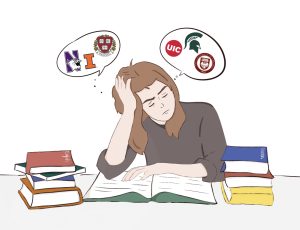Seal of Biliteracy recognizes multilingual students
New exam offers diploma of biliteracy for students in language classes.
February 22, 2017
This year the MCL department will be offering students the opportunity to earn a Seal of Biliteracy in various languages on their diploma.
The Seal of Biliteracy and its sibling, Commendation towards Biliteracy, started in California, and was adopted by Illinois in 2013. The award can be earned in various languages, as well as for non-native English speakers. It takes the form of a physical stamp on a graduate’s diploma and their transcript.
While students can earn the seal by scoring a 4 or 5 on the AP exam in their respective language, a new test from the American Council on the Teaching of Foreign Languages (ACTFL) called the Assessment of Performance toward Proficiency in Languages (AAPPL) exam is available in more languages.
The AAPPL tests all realms of language knowledge, including listening, speaking, reading and writing. A friendly on-screen avatar guides the students to say as much as you can in the language and nods and tilts its head mimicking the body language of a real-life listener.
“It’s really about what you can do with the language. Can you read, can you listen, can you respond appropriately?” asked Lorri Starck-King, the MCL Department Chair.
Senior Ellie Pearlman, who took the test last year as the department piloted the program said, “I thought it was kind of fun, it was cool because part of the speaking portion was a simulation of a facetime conversation with a native speaker.”
Hebrew and Japanese students will take a different test called the Standards-based Measurement of Proficiency, and Latin students will take a different test from the ACTFL called the Latin Interpretive Reading Assessment to earn the seal of biliteracy.
The test is also being geared in part towards heritage language speakers, such as the children of first or second generation immigrants who have learned a language at home.
For this reason, the school will also allow students to test for the seal in Arabic, Portuguese, Italian, and Russian.
“In today’s world, it is extremely beneficial for our students to embrace their ancestry, native languages and cultural diversity,” said Alderman Ray Suarez of Chicago’s 31st ward, after CPS adopted the seal in 2015.
Stark-King said that this program “recognizes our native speakers and our heritage language students, those students who may not be in a French class but might speak French at home.”
She explained that the department has already had several students sign up to take tests for languages not taught New Trier, namely several speakers of Russian.
However some students feel excluded by the current offering of languages. Junior Ana Cornell, the daughter of Romanian immigrants felt that the languages offered were a bit unfair.
“I can name seven people off the top of my head that speak Romanian at this school. I can’t think of one Portuguese speaker” she said in protest. “I also learned two languages, why does the fact that mine is more uncommon have to hurt me?”
Junior Stephen Hajjar, who does in fact speak Portuguese, felt differently, explaining that the test wasn’t too big of a deal, particularly for college admissions.
“I am already listing Portuguese as my first language, so I don’t think the test would make a big difference,” He said. Hajjar also studies Spanish at New Trier and is planning to take the AP exam, making him eligible for the seal. Another Romanian speaker, senior Paul Farcasanu, explained that he didn’t mind much that Romanian was not eligible for the seal.
Stark-King explained that the tests are developed and approved by an outside organization and that “those are the ones that are available, so those are the ones we offer.”
The ACTFL has stated that AAPPL tests for new languages are in development.
Farcasanu, who studied French all four years explained that he does not plan to take the test for French either as he has already been accepted to college.
Pearlman felt similarly, and explained that despite the “part of me that cares about the stamp,” she had already been admitted to college, and wasn’t sure if she wanted to spend the time or money.
“I don’t know how much it would have helped either way, unless you’re majoring in communications or Spanish,” she said
Charles Murphy Associate Director of Recruitment & Outreach from the University of Illinois at Urbana-Champaign office of undergraduate admissions said that while the Seal of Biliteracy would be considered an honor or award in their application review process, “we will put much more emphasis on the performance and level of second language courses in high school.”
Stark-King explained that, because of the limited number of people who can take the test, seniors are given priority.
“Since the further you get along in your language learning, the more you will be able to do, we think students will be more successful if they get further down that path.”
Reminding students that neither a single test nor the seal is the end-all-be-all of language learning, she added, “We hope they will be life-long language learners no matter what language they are studying.”













































